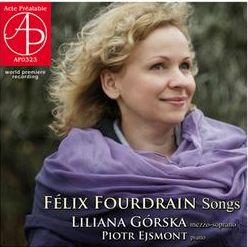|

Support us financially by purchasing
this disc through MusicWeb
for £13.50 postage paid world-wide.

|
Félix FOURDRAIN (1880 - 1923)
Songs
see end of review for track listing
Liliana Górska (mezzo), Piotr Ejsmont (piano)
rec. Studio Nagrań Akademii Muzycznej, St. Moniuszki, Gdańsk, 2013
Sung texts with Polish and English translations
ACTE PRÉALABLE AP0323 [47:13]
Since I presume that there must be a number of readers
of this review who know just as much about the composer as I did when
I got this disc - nothing - I had better give a brief pen portrait of
Félix Fourdrain.
Born in Nice in 1880, he revealed talent for music as well as fine arts at a very early age. When he was 12 he was able to stand in for his organist father and later was admitted to the organ class at the Paris Conservatory. Quite early he decided to devote his life to composing and was able to study under Jules Massenet. He also met two authors, Henri Cain and Arthur Bernède, who jointly wrote the libretto for a musical legend, La légende du Point d’Argentan,which Fourdrain set to music. It is regarded by many as his best composition and was given to the Opéra Comique in 1903 but was not premiered until 1907. He wrote a number of further lyrical dramas, amongst which there is a piece based on Perrault’s fairy tales. La Légende was premiered on 27 December 1913. The role of the disguised prince was played by the then only 19-year-old Yvonne Printemps, one of the foremost French operetta singers and actresses. Fourdrain was a hardworking and obviously inspired composer and when he died at the age of 43 his total oeuvre included more than twenty stage works, about one hundred orchestral pieces, instrumental items and songs. His operetta La Hussarde, staged posthumously in 1925, was a great success and has since been played more than one hundred times.
Obviously his name and his works have fallen into oblivion and are rarely found in encyclopaedias. It was Jan A. Jarnicki, the founder of Acte Préalable, who found these songs and decided to record them. Liliana Górska, the singer here, fell in love with them at first sight. I must admit that I did the same when I heard them and they are certainly my discovery of the year.
They are beautiful, eminently singable, have a distinctive personal touch, and the accompaniments are lushly impressionistic, rather elaborate and often with a humoristic twist at the end. Add to this the poems, all but two by André Alexandre, which have substance as well as being grateful for the singer. No. 14 has a text by Arthur Bernède and No. 21 by Jean Richepin.
All the songs are highly attractive, but let me pick a handful as suitable appetizers for the unconvinced: the delicious Carnaval (tr. 7) with its colourful and atmospheric depiction of the festivities and the amorous admiration of the Queen; the nostalgic-realistic Le vieux moulin (tr. 9); the lovely Edelweiss (tr. 11); the socio-realistic Marins d’Islande (tr.12) with its sympathetic delineation of the fishermen’s struggle in the forbidding ocean around distant Iceland; the lovely (pardon my lack of synonyms, but these songs are lovely) La belle aux yeux d’amour (tr. 14).
The singing is invariably excellent, and the pianist negotiates the elaborate accompaniments with élan. A big armful of roses to all involved for making these lovely songs available to the general public in this world premiere recording.
Göran Forsling
Track listing
1. Les petites communiantes [2:06]
2. Alger le soir [2:52]
3. Le papillon [1:53]
4. Le long des saules [1:47]
5. Il neige des fleurs [1:36]
6. Les abeilles [2:08]
7. Carnaval [2:21]
8. Fleurs de paravent [2:21]
9. Le vieux moulin [2:42]
10. L’oasis [2:46]
11. Edelweiss [2:27]
12. Marins d’Islande [3:21]
13.Là-bas [2:14]
14. La belle aux yeux d’amour [2:10]
15. La dentellière de Bayeux [2:15]
16. Les mouettes [2:30]
17. Sainte Dorothée [2:21]
18. Chevauchée Cosaque [1:34]
19. Chanson Norvégienne [1:42]
20. Lettre d’adieu [2:26]
21. Noël de neige, Op. 60 [1:32]
|



 All Nimbus reviews
All Nimbus reviews








